Key takeaways:
- Self-love is an ongoing journey that involves embracing imperfections and rejecting comparisons to others.
- Identifying and challenging personal limiting beliefs can lead to a more empowering self-narrative and improved self-esteem.
- Consistent self-care routines, positive influences, and community support are essential for maintaining long-term self-love practices.
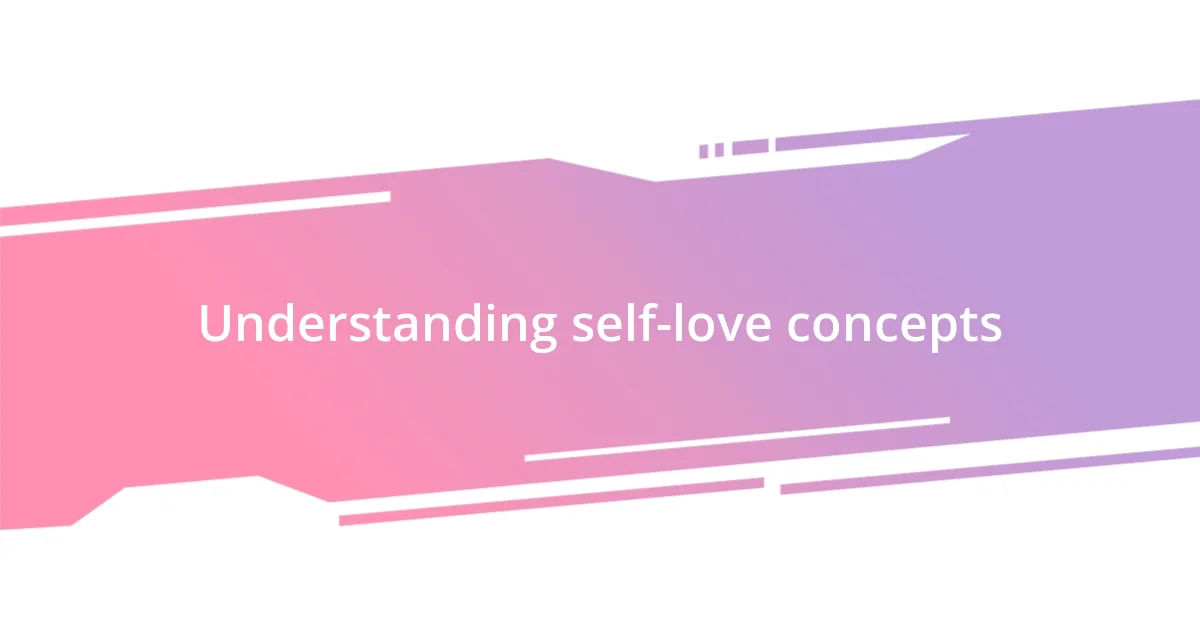
Understanding self-love concepts
Self-love often seems like a vague concept, but to me, it represents an ongoing journey rather than a destination. Initially, I thought loving myself merely meant feeling good when I accomplished something. However, I’ve come to realize that true self-love is about embracing my imperfections and recognizing my worth, regardless of achievements. Have you ever felt that weight lifted off your shoulders when you accept yourself just as you are?
One realization that profoundly impacted my understanding of self-love was when I decided to stop comparing myself to others. I remember scrolling through social media and feeling inadequate, questioning why I didn’t look or live like the people I admired. The moment I shifted my focus inward, I began to appreciate my unique journey. This shift wasn’t just enlightening; it was liberating. Isn’t it fascinating how self-love can stem from simply appreciating our individual paths?
Meditation has been a crucial aspect of my self-love practice. It taught me to cultivate awareness of my thoughts and feelings, helping me recognize when I was being overly critical of myself. During one meditation session, I vividly felt an overwhelming sense of warmth and acceptance wash over me, making me realize that loving oneself is about forgiveness too. Have you ever embraced a part of yourself that you initially found unlovable? That’s where the magic of self-love truly lies.
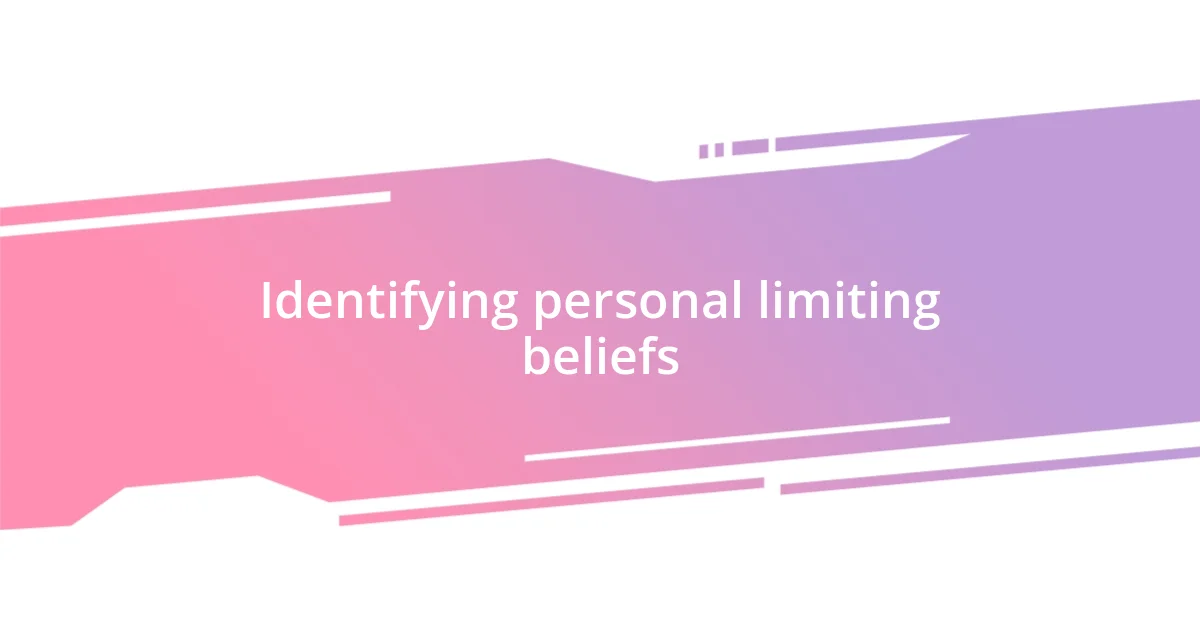
Identifying personal limiting beliefs
Identifying personal limiting beliefs is a crucial step in the journey toward self-love. I found that these beliefs often whisper lies that echo in my mind, telling me I’m not enough or that I’m unworthy of happiness. A powerful moment for me was when I penned down those negative thoughts. Seeing them on paper made it painfully clear how unfounded and exaggerated they were.
To dig deeper into the beliefs that were holding me back, I often asked myself some essential questions:
- What recurring thoughts do I have about my abilities?
- Are these beliefs based on facts, or are they simply my fears talking?
- When did I first adopt these beliefs, and are they still relevant today?
- How do these beliefs affect my choices and relationships?
- Can I replace these beliefs with more empowering ones?
Reflecting on these questions has been eye-opening and has led me to challenge those inner critics. For instance, I realized my fear of failure stemmed from a childhood experience where I was sharply criticized for not excelling academically. By confronting that belief, I could replace it with the understanding that failure is just a stepping stone to growth. I’m curious, have you ever unraveled a deep-seated belief that no longer served you?

Ways to practice self-acceptance
One effective way to practice self-acceptance is through journaling. I remember how hesitant I was to put pen to paper, fearing my thoughts might be too chaotic or negative. However, once I started writing regularly, something beautiful occurred—I found clarity. Through my journal pages, I could explore my feelings without judgment and celebrate my daily triumphs, no matter how small. It truly became a mirror reflecting my genuine self, reminding me that I am worthy of love as I am.
Another powerful method is surrounding yourself with positive influences. Early in my journey, I realized that some relationships were draining my self-esteem. By consciously engaging with those who uplift and inspire me, I’ve cultivated an environment rich in support and encouragement. I’ve learned that the company I keep greatly impacts my self-perception. Have you noticed how spending time with optimistic friends or mentors can shift your mindset? Their positivity can be contagious, igniting a warmth inside you that reinforces your worth.
Additionally, setting healthy boundaries is crucial for self-acceptance. I used to struggle with saying no, often overcommitting myself to gain approval. One day, I decided to prioritize my well-being by setting limits, and the relief was palpable. Being able to say no without guilt has been empowering, enhancing my sense of self-respect. It’s fascinating how reclaiming my time allowed me to focus on what truly matters to me. Have you taken the time to establish boundaries in your life? The journey to self-acceptance becomes more manageable when you protect your personal space.
| Technique | Description |
|---|---|
| Journaling | Writing regularly helps clarify thoughts and emotions, allowing for personal reflection. |
| Positive Influences | Engaging with uplifting individuals fosters an encouraging environment that boosts self-esteem. |
| Healthy Boundaries | Setting limits empowers you to prioritize your well-being and respect your time. |
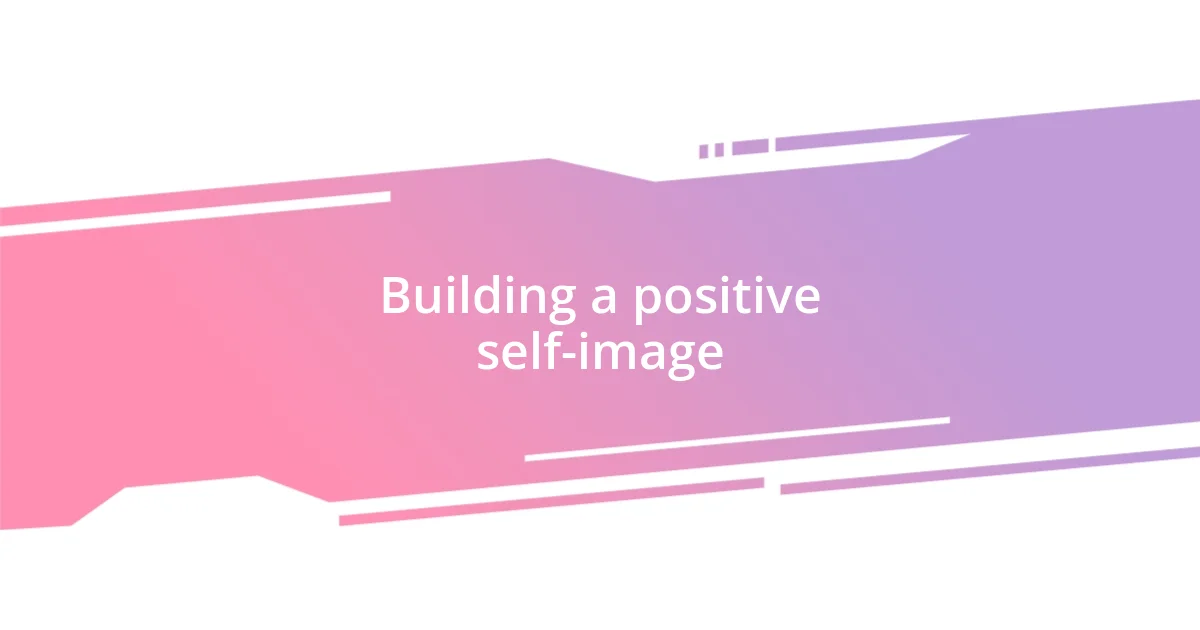
Building a positive self-image
Building a positive self-image really starts with how we talk to ourselves. I remember a time when I would look in the mirror and pick apart every flaw—my skin, my weight, my hair. It wasn’t until I consciously shifted my internal dialogue to focus on my strengths and accomplishments that I noticed a delightful change. Have you ever tried complimenting yourself out loud? It might feel strange at first, but trust me; it can reshape how you perceive your worth.
Visualizing my goals also played a significant role in enhancing my self-image. I vividly recall a evening spent creating a vision board filled with images and quotes that inspired me. Each glance at it reminded me of the person I aspired to be. It’s fascinating how seeing those goals in a concrete way can motivate you to acknowledge your potential. When was the last time you paused to visualize your dreams? That exercise can make your aspirations feel not only achievable but also a reflection of your value.
Finally, embracing imperfection is a game-changer. I’ve had my fair share of slip-ups, and initially, I would berate myself for it. However, I learned that each misstep is a chance to grow and learn. Now, when I stumble, I ask myself, “What lesson can I take away from this?” This shift has deepened my understanding of self-compassion. How do you treat yourself during those tough moments? Embracing your flaws can truly create a positive self-image, reminding us that being human is all about the journey of growth.
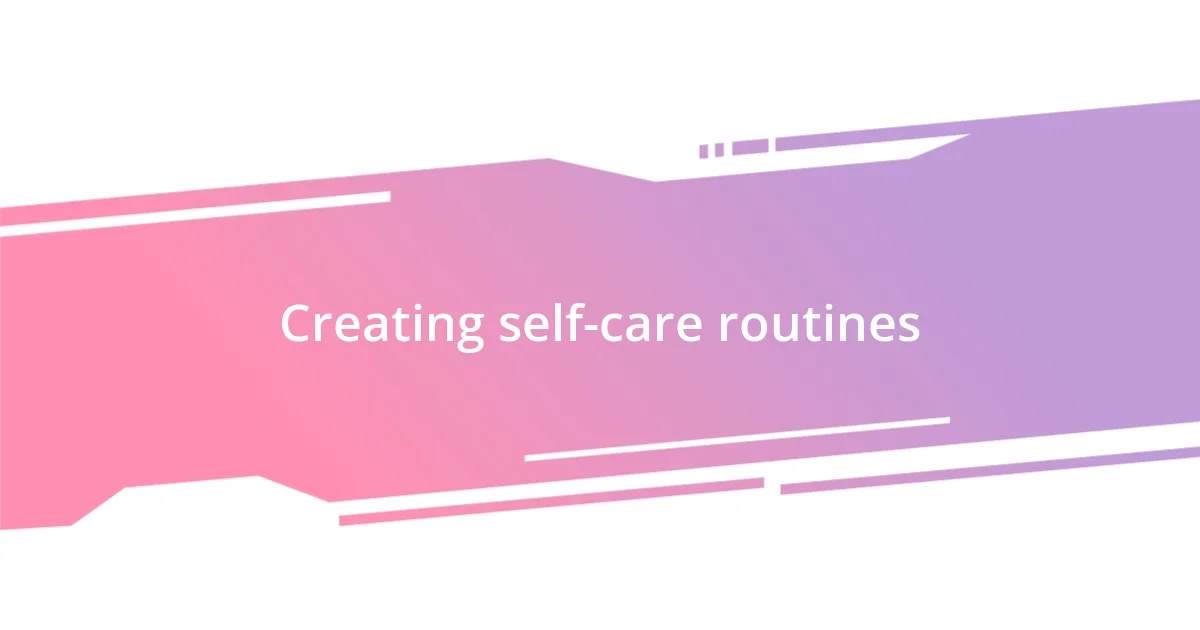
Creating self-care routines
Creating a self-care routine can be a profoundly transformative experience. Personally, I found that setting aside just a few minutes each day for activities that nourish my soul made a world of difference. Whether it’s sipping my coffee in the morning silence or indulging in a long, warm bath, these small rituals create a sanctuary where I can recharge. What simple pleasures do you cherish in your daily life? They might hold the key to your self-care.
I’ve also learned the value of physical activity in my routine. I used to view exercise as a chore, something to tick off my to-do list. But when I started dancing at home, I realized it was more than just a workout—it became a joyful escape. Moving my body not only boosted my mood but also fostered a deep appreciation for what my body can do. Have you ever considered finding an activity that truly brings you joy rather than just focusing on fitness? It’s liberating to approach self-care from a place of joy rather than obligation.
Incorporating mindfulness practices into my routine has been another breakthrough. Initially, I resisted meditation, thinking I couldn’t quiet my racing thoughts. However, once I allowed myself to sit in stillness without judgment, I discovered a treasure trove of peace within. It’s fascinating to think that just a few minutes of intentional breathing can ground me amidst life’s chaos. Have you thought about how mindfulness could transform your day? The clarity and calm it brings are invaluable as you navigate the ups and downs of life.
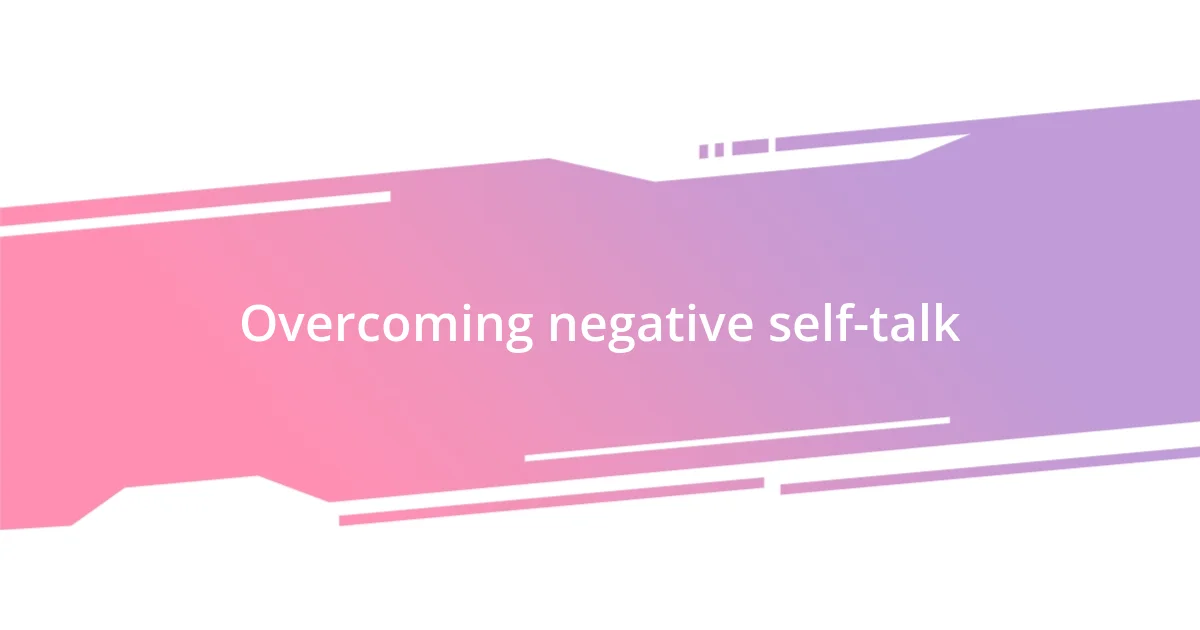
Overcoming negative self-talk
Negative self-talk can often feel like an unwelcome companion, whispering doubts and insecurities that chip away at our self-esteem. I distinctly remember a moment when I overheard myself saying, “You’ll never be good enough.” That realization struck me like a bolt of lightning. It made me pause and think—if I heard a friend say that, what would I say to them? Why was I treating myself with such harshness? This tiny shift in perspective helped me realize that I had the power to change that narrative.
I started by actively challenging those inner critics. When a negative thought surfaced, I would counter it with something positive. For instance, when I caught myself thinking, “I’m not skilled enough for this project,” I would respond with, “I’ve completed similar tasks successfully before.” Practicing this kind of self-affirmation was like training a muscle; it became easier over time. Have you ever noticed how powerful it feels to confront negativity with evidence of your strengths? I found that this internal dialogue began to reshape my overall mindset.
Eventually, I began journaling my thoughts to bring clarity to the chaos swirling in my mind. Writing down negative self-talk not only illuminated the absurdity of some issues but also helped me identify patterns. I remember one entry where I realized I constantly worried about others’ opinions. By recognizing this, I could transform my perspective, focusing instead on how I see myself. Do you journal? It may be the key to uncovering that inner voice and rewriting its script. It’s amazing what happens when you consciously focus on replacing negativity with kindness.
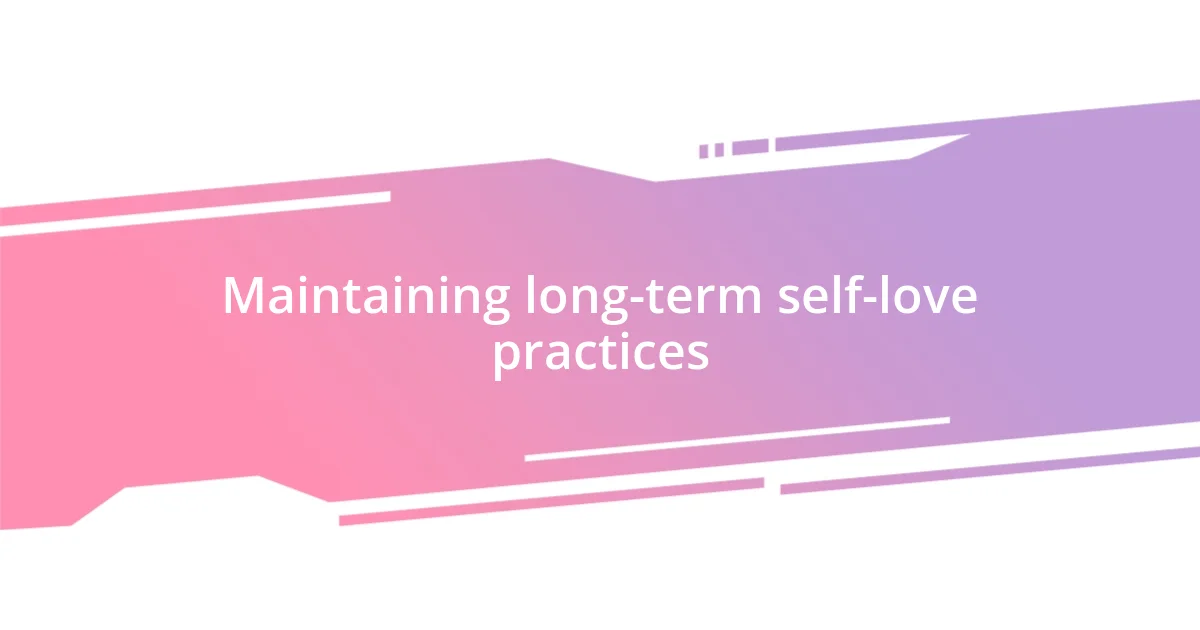
Maintaining long-term self-love practices
Maintaining a long-term self-love practice requires consistent effort and a bit of creativity. I recall a time when I struggled to keep my self-love routines fresh. To combat this, I decided to create a self-love jar, filling it with notes of things I appreciate about myself and moments that brought me joy. On days when I felt low, revisiting those notes served as a heartwarming reminder of my personal worth. Have you ever considered your life experiences as treasures you can revisit during tougher days?
Another aspect I’ve embraced is the power of community support. I made it a priority to surround myself with people who uplift and inspire me. It’s incredible how a simple coffee chat with a good friend can reignite my self-love. I vividly remember an afternoon when my friend complimented my resilience during a challenge. Her kind words acted like a balm, reinforcing the belief that I am enough. Have you looked around at your support circle lately? The positivity from those relationships can significantly bolster our self-love journey.
Lastly, I’ve learned to check in with myself regularly. I ask myself how I’ve been treating my own feelings and needs. There have been moments when I realized I was stretching myself too thin, leading to burnout. Recognizing this, I took a step back and carved out time for the activities that light me up—such as painting or hiking. What activities make you feel alive? By tuning in to what truly nourishes my spirit, I ensure that self-love remains a vibrant part of my daily life.














